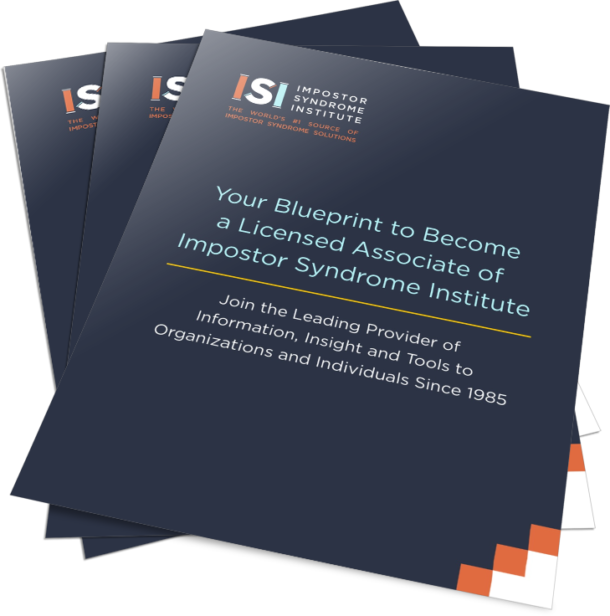MY IMPOSTOR STORY
“Oh my God,” I thought,
“she’s talking about me!”
In 1982 I was four years into a graduate program in education at the University of Massachusetts in Amherst and procrastinating terribly on writing my dissertation.
One day while I was sitting in class, another student began reading aloud from an article by a couple of psychologists from Georgia State University, Dr. Pauline Rose Clance and Dr. Suzanne Imes, titled, “The Impostor Phenomenon in High Achieving Women.”
Subsequent studies determined that impostor feelings are hardly unique to women. Plenty of men also feel like impostors — some painfully so.
On that particular day though, I was responding to the 162 high- achieving women that Clance and Imes had sampled among whom they uncovered a pervasive pattern of dismissing accomplishments and believing that their success would disappear once others discovered the awful secret that they were, in fact, “impostors.”
My head was nodding like a bobble- head doll’s. “Oh my God,” I thought, “she’s talking about me!”
When I looked around the room, everyone else—including the professor—was nodding too.
I couldn’t believe my eyes. I knew these people. I’d been in class with them, I’d taught alongside them, I’d read their work. To me, they were intelligent, articulate, and supremely competent individuals.
To learn that even they felt like they were fooling others rocked my world.
A group of us began to meet as a kind of informal impostor-support group.
We talked about how intimidated we felt when we discussed our research with our faculty advisers… how more often than not we left these sessions feeling confused and inept…
How we’d clearly put one over on the admissions office… and how anyone who looked too closely would realize we weren’t scholar material after all.
We all agreed that these feelings of intellectual fraudulence were keeping us from finishing our dissertations in a timely fashion—or, in my case, from even starting.
Just being in the company of like- minded women was tremendously reassuring.
Everything was going pretty well until about the third meeting.
That’s when I began to have this nagging sense that even though they were saying they felt like impostors … I knew I was the only “real” impostor!
Turning Pain into Gain
I realized that while talking is an important first step, you can’t share your way out of impostor syndrome.
I knew I had a choice…
I could let my own secret fears continue to stand between me and my goals, or I could channel my energy into trying to understand them.
I chose the latter.
The impostor phenomenon became the impetus for my doctoral research, in which I explored the broader question of why so many clearly intelligent, capable women feel anything but.
My search for answers entailed in-depth interviews with a highly racially diverse group of fifteen women: executives, clinicians, social service providers, and academic advisors. I wanted to hear from them about the kinds of internal barriers to success they’d observed in the women they managed, counseled, or advised.
What I learned became the basis for a day-long workshop called “Overcoming the Imposter Syndrome: Issues of Competence and Confidence for Women,” which I co-led with fellow grad student Lee Anne Bell.
Lee and I booked a small meeting room at a local hotel, put up some flyers, and hoped that at least a few people would come.
When forty women showed up, we knew we’d hit a nerve.
We facilitated several more packed workshops before Lee relocated to pursue a career in higher education.
In 2001 I launched a revised workshop called “How to Feel as Bright and Capable as Everyone Seems to Think You Are: Why Smart Women and Men Suffer from the Impostor Syndrome and What to Do About It.”
Taking impostor feelings out of the realm of therapy and into an educational arena has proved tremendously successful. To date, more than 80,000 people have attended this program.
Simply giving people an alternative way of thinking about themselves and about competence has yielded some amazing results.
- Women reported asking for—and getting– raises.
- Corporate execs who had participated in a workshop as students told of being so transformed that years later they asked me to address their employees.
- Writers who had played small for years became prolific.
- People who had lacked the confidence to start or grow a business suddenly found the courage to go for it.
The core of my work stems from my original doctoral research.
I also draw from my own professional and management experience including seven years in a Fortune 200 company – two in training and development and five as a manager in strategic marketing.
I draw too from my two-plus decades as an entrepreneur.
However, most of what I’ve learned about the impostor syndrome comes from over a quarter of a century of collective experience and wisdom gleaned from the men and women who’ve attended my workshops.
They come from all walks of life… nurses, engineers, psychologists, programmers, optometrists, administrative assistants, jewelers, physicians, executives, professors, cancer researchers, social workers, teachers, attorneys… and on and on.
Despite their various situations and occupations, the women and men I’ve worked with have one important thing in common: They are no impostors.
And, as you will soon discover, neither are you.



